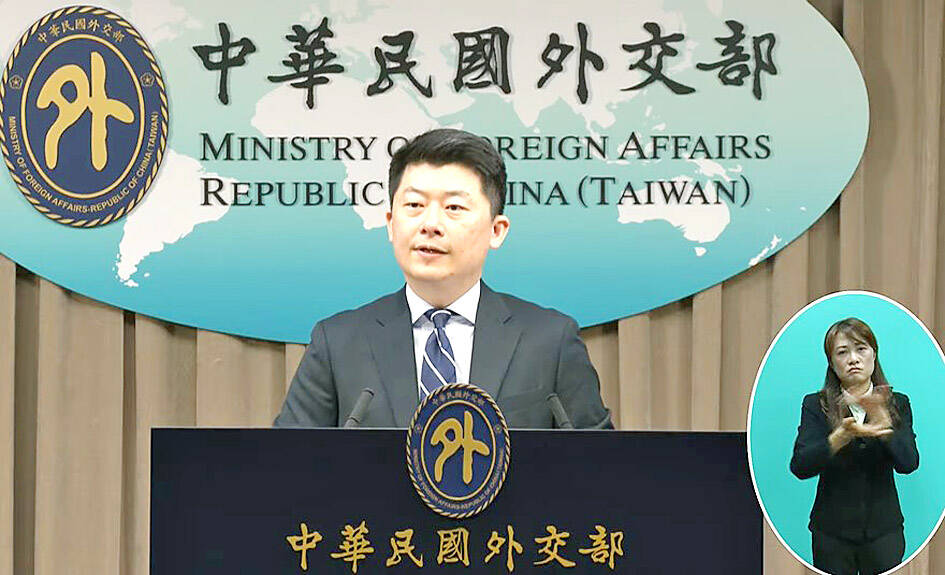The Ministry of Foreign Affairs has advised against traveling to South Africa due to poor public security and warned of telephone scams targeting overseas Taiwanese.
The ministry issued an “orange” travel alert for South Africa at the end of last month due to an increase in cholera cases, rolling power cuts and deteriorating law and order.
South African Police Service statistics showed that 6,289 people were murdered in the first quarter of this year, up 3.4 percent from the same period last year, Department of West Asian and African Affairs Deputy Director Wu Cheng-wei (吳正偉) told a news conference in Taipei yesterday.

Photo: screen grab from a Ministry of Foreign Affairs Web cast
There are an average of 13 carjacking, robbery or theft cases every hour in South Africa, which also indicates a deterioration in law and order, Wu said.
The Taipei Liaison Office in the Republic of South Africa recently received reports from a number of overseas Taiwanese, who said they had received suspicious phone calls and were asked to provide their bank account information or transfer money, he said.
The callers pretended to be staff from the Chinese embassy in South Africa or South African government or law enforcement agencies, Wu said.
The callers said that there were documents or packages waiting for them to collect, that their taxes were in arrears or they were involved in criminal cases in China, he said.
Wu urged people to be aware of these fraudulent practices and to refrain from transferring money or providing account information over the phone.
In case of an emergency, Taiwanese in South Africa can call the local liaison office at 082-802-9380 or the ministry’s emergency number +886-800-085-095, he said.
He also warned about an increase in employment scams in the Caucasus region, where some Taiwanese were recruited to engage in illegal work such as telecom fraud.
Groups have lured Taiwanese with promises of high salaries, then isolated and held them prisoner once they were abroad, he said.
The ministry urged jobseekers to look into the background of the companies they are interested in working for and check whether they are legally registered locally, he said.
When encountering emergencies in countries where Taiwan has no representative office, people can call the emergency line to seek help, he said.

INVESTIGATION: The case is the latest instance of a DPP figure being implicated in an espionage network accused of allegedly leaking information to Chinese intelligence Democratic Progressive Party (DPP) member Ho Jen-chieh (何仁傑) was detained and held incommunicado yesterday on suspicion of spying for China during his tenure as assistant to then-minister of foreign affairs Joseph Wu (吳釗燮). The Taipei District Prosecutors’ Office said Ho was implicated during its investigation into alleged spying activities by former Presidential Office consultant Wu Shang-yu (吳尚雨). Prosecutors said there is reason to believe Ho breached the National Security Act (國家安全法) by leaking classified Ministry of Foreign Affairs information to Chinese intelligence. Following interrogation, prosecutors petitioned the Taipei District Court to detain Ho, citing concerns over potential collusion or tampering of evidence. The

‘FORM OF PROTEST’: The German Institute Taipei said it was ‘shocked’ to see Nazi symbolism used in connection with political aims as it condemned the incident Sung Chien-liang (宋建樑), who led efforts to recall Democratic Progressive Party (DPP) Legislator Lee Kun-cheng (李坤城), was released on bail of NT$80,000 yesterday amid an outcry over a Nazi armband he wore to questioning the night before. Sung arrived at the New Taipei City District Prosecutors’ Office for questioning in a recall petition forgery case on Tuesday night wearing a red armband bearing a swastika, carrying a copy of Adolf Hitler’s Mein Kampf and giving a Nazi salute. Sung left the building at 1:15am without the armband and apparently covering the book with a coat. This is a serious international scandal and Chinese

Seventy percent of middle and elementary schools now conduct English classes entirely in English, the Ministry of Education said, as it encourages schools nationwide to adopt this practice Minister of Education (MOE) Cheng Ying-yao (鄭英耀) is scheduled to present a report on the government’s bilingual education policy to the Legislative Yuan’s Education and Culture Committee today. The report would outline strategies aimed at expanding access to education, reducing regional disparities and improving talent cultivation. Implementation of bilingual education policies has varied across local governments, occasionally drawing public criticism. For example, some schools have required teachers of non-English subjects to pass English proficiency

TRADE: The premier pledged safeguards on ‘Made in Taiwan’ labeling, anti-dumping measures and stricter export controls to strengthen its position in trade talks Products labeled “made in Taiwan” must be genuinely made in Taiwan, Premier Cho Jung-tai (卓榮泰) said yesterday, vowing to enforce strict safeguards against “origin laundering” and initiate anti-dumping investigations to prevent China dumping its products in Taiwan. Cho made the remarks in a discussion session with representatives from industries in Kaohsiung. In response to the US government’s recent announcement of “reciprocal” tariffs on its trading partners, President William Lai (賴清德) and Cho last week began a series of consultations with industry leaders nationwide to gather feedback and address concerns. Taiwanese and US officials held a videoconference on Friday evening to discuss the